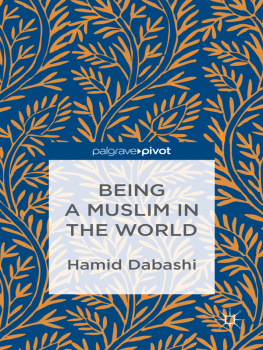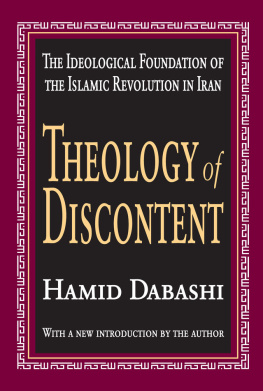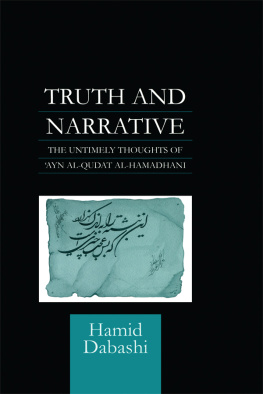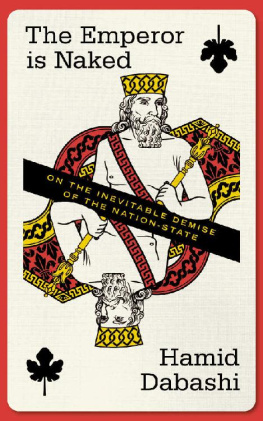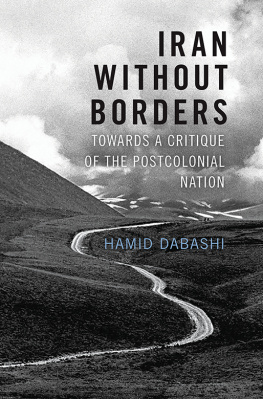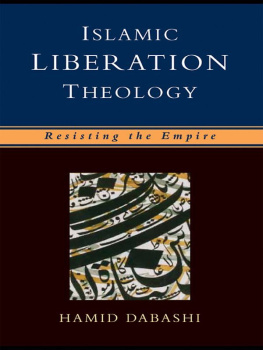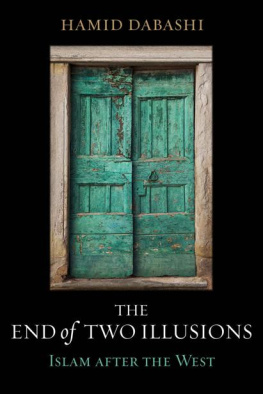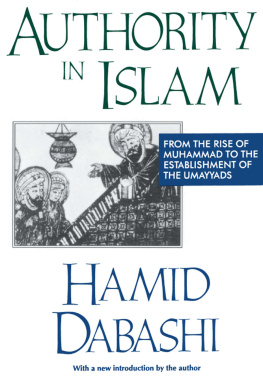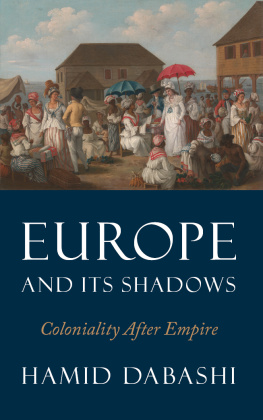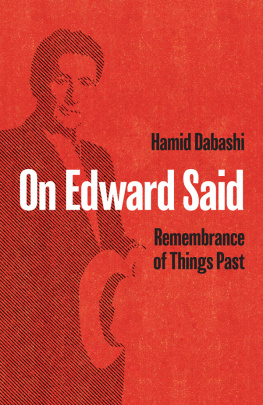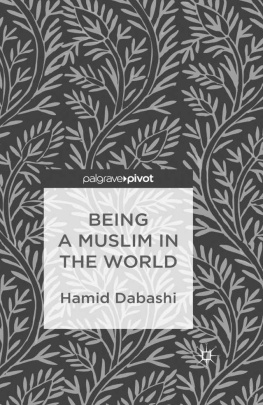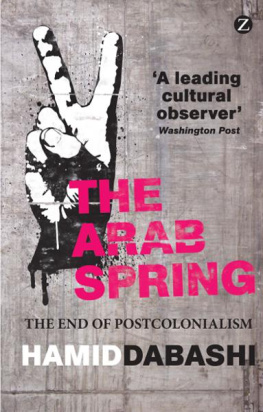Hamid Dabashi - Being a Muslim in the World
Here you can read online Hamid Dabashi - Being a Muslim in the World full text of the book (entire story) in english for free. Download pdf and epub, get meaning, cover and reviews about this ebook. year: 2013, publisher: Palgrave Macmillan, genre: Politics. Description of the work, (preface) as well as reviews are available. Best literature library LitArk.com created for fans of good reading and offers a wide selection of genres:
Romance novel
Science fiction
Adventure
Detective
Science
History
Home and family
Prose
Art
Politics
Computer
Non-fiction
Religion
Business
Children
Humor
Choose a favorite category and find really read worthwhile books. Enjoy immersion in the world of imagination, feel the emotions of the characters or learn something new for yourself, make an fascinating discovery.
- Book:Being a Muslim in the World
- Author:
- Publisher:Palgrave Macmillan
- Genre:
- Year:2013
- Rating:4 / 5
- Favourites:Add to favourites
- Your mark:
- 80
- 1
- 2
- 3
- 4
- 5
Being a Muslim in the World: summary, description and annotation
We offer to read an annotation, description, summary or preface (depends on what the author of the book "Being a Muslim in the World" wrote himself). If you haven't found the necessary information about the book — write in the comments, we will try to find it.
Being a Muslim in the World — read online for free the complete book (whole text) full work
Below is the text of the book, divided by pages. System saving the place of the last page read, allows you to conveniently read the book "Being a Muslim in the World" online for free, without having to search again every time where you left off. Put a bookmark, and you can go to the page where you finished reading at any time.
Font size:
Interval:
Bookmark:
Being a Muslim in the World
Other Palgrave Pivot titles
G. Douglas Atkins: T.S. Eliot Materialized: Literal Meaning and Embodied Truth
Martin Barker: Live To Your Local Cinema: The Remarkable Rise of Livecasting
Michael Bennett: Narrating the Past through Theatre: Four Crucial Texts
Arthur Asa Berger: Media, Myth, and Society
David Elliott: Fukushima:Impacts and Implications
Milton J. Esman: The Emerging American Garrison State
Kelly Forrest: Moments, Attachment and Formations of Selfhood: Dancing with Now
Steve Fuller: Preparing for Life in Humanity 2.0
Ioannis N. Grigoriadis: Instilling Religion in Greek and Turkish Nationalism: A Sacred Synthesis
Jonathan Hart: Textual Imitation: Making and Seeing in Literature
Akira Iriye: Global and Transnational History: The Past, Present, and Future
Mikael Klintman: Citizen-Consumers and Evolutionary Theory: Reducing Environmental Harm through Our Social Motivation
Helen Jefferson Lenskyj: Gender Politics and the Olympic Industry
Christos Lynteris: The Spirit of Selflessness in Maoist China: Socialist Medicine and the New Man
Ekpen James Omonbude: Cross-border Oil and Gas Pipelines and the Role of the Transit Country: Economics, Challenges, and Solutions
William F. Pinar: Curriculum Studies in the United States: Present Circumstances, Intellectual Histories
Henry Rosemont, Jr.: A Readers Companion to the ConfucianAnalects
Kazuhiko Togo (editor): Japan and Reconciliation in Post-war Asia: The Murayama Statement and Its Implications
Joel Wainwright: Geopiracy: Oaxaca, Militant Empiricism, and Geographical Thought
Kath Woodward: Sporting Times

Being a Muslim
in the World
Hamid Dabashi


BEING A MUSLIM IN THE WORLD
Copyright Hamid Dabashi, 2013.
All rights reserved.
First published in 2013 by
PALGRAVE MACMILLAN
in the United Statesa division of St. Martins Press LLC,
175 Fifth Avenue, New York, NY 10010.
Where this book is distributed in the UK, Europe and the rest of the world, this is by Palgrave Macmillan, a division of Macmillan Publishers Limited, registered in England, company number 785998, of Houndmills, Basingstoke, Hampshire RG21 6XS.
Palgrave Macmillan is the global academic imprint of the above companies and has companies and representatives throughout the world.
Palgrave and Macmillan are registered trademarks in the United States, the United Kingdom, Europe and other countries.
ISBN: 9781137301291 EPUB
ISBN: 9781137301291 PDF
ISBN: 9781137301284 Hardback
Library of Congress Cataloging-in-Publication Data is available from the Library of Congress.
A catalogue record of the book is available from the British Library.
First edition: 2013
www.palgrave.com/pivot
DOI: 10.1057/9781137301291
For the memories
of my mothers silent prayers
and my fathers loud protests
In the name of God, the Beneficent, the Merciful
Hast thou observed him who belieth religion?
That is he who repelleth the orphan
And urgeth not the feeding of the needy.
Ah, woe unto worshippers
Who are heedless of their prayer;
Who would be seen (at worship)
Yet refuse small kindnesses!
The Holy Quran, chapter 107, Al-Maun/Acts of Kindness
Contents

Introduction: Muslims in the World
Civilization: The West and the Restwho would write a book with a title like that today, and what could it possibly mean? The British historian Niall Ferguson has made a reputation for himself for theorizing the West as the defining disposition of humanity at large. But like many other latter-day ideologues of the beleaguered empire, Niall Ferguson is more a panegyrist of the West than its prognosticator.
If the idea that science, medicine, or work ethic were the virtues and achievements that civilizations around the globe lacked before the West appeared on the horizon was offered in a sophomoric essay in any half decent college, the idiocy would earn a much-deserved F for the student. But why is it that when offered by an historian it receives a bravura publication? The answer has to be in the realm of the mass hysteria that these sorts of ideas generate at the world-historic moment when this very West, as an idea, is witnessing its own demise. That we are living through the end of Western ascendancy, so far as Ferguson thinks he is the harbinger of that good tiding, is a splendid thingfor that ascendency was predicated on mass murder and mayhem from one end of the earth to the other (including the European Holocaust), and on the global plundering of planetary resources. The word civilization in Fergusons title is the giveawaythe unabashedly racialized self-congratulation that before this West there was no civility, and that after the Wests demise it will die. As a categorical imperative, the West is dying, and that is a good thingfor that means the world is delivered from one of the ghastliest imperial projects ever historically coined and experienced. As for science, medicine, literature, philosophy, and suchwhat the West picked up from previous empires and expanded upon will survive its demise and be carried over into the new global formations of the world. Upon that world, peopleincluding Muslimswill now have to imagine themselves in a post-Western history that is finally delivered from one particularly troublesome delusion.
To be in the world
The West is no moreand nor are, a fortiori, all the binaries it has coined and crafted over the last two hundred years pluschief among them the notion of Islam that Orientalism invented for the West. The West and the Rest was the language of the European and American imperialism at the height of the normative hegemony that crafted the West and subjugated the Rest. Niall Ferguson and his ilk come at the tail end of that narrative fiction. Financially bankrupt (look at Greece, the fictive birthplace of the West); politically corrupt (look at presidential elections in the US); economically stagnant (look at the US debt to China); and diplomatically inept (look at the Iranian nuclear issue), all signs indicate that this thing Niall Ferguson still calls the West has long since implodedwith post-modernism and post-structuralism as its paramount philosophical eulogies.
What does it mean to be a Muslim in this post-Western world? What world will Muslims inhabit in post-Western societies, in or out of the Muslim world as we have hitherto understood, defined, and located it? In what way can even we talk about a Muslim world, and how is that world different, integral, or embedded in other worlds? Doesnt the end of the West as a self-asserted criterion also mean the end of Muslim world as it was manufactured in liaison with that divisive category?
To have a world means to have an attitude toward it, as Gadamer noted in Truth and Method
Next pageFont size:
Interval:
Bookmark:
Similar books «Being a Muslim in the World»
Look at similar books to Being a Muslim in the World. We have selected literature similar in name and meaning in the hope of providing readers with more options to find new, interesting, not yet read works.
Discussion, reviews of the book Being a Muslim in the World and just readers' own opinions. Leave your comments, write what you think about the work, its meaning or the main characters. Specify what exactly you liked and what you didn't like, and why you think so.

